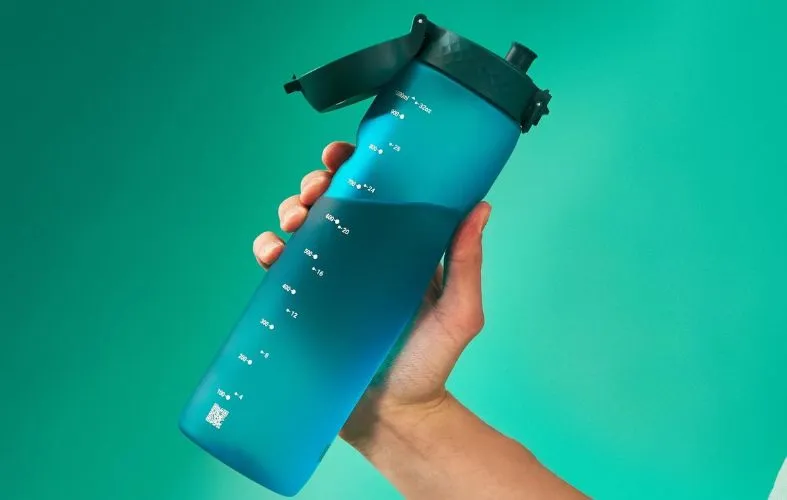
Share this page with friends
How Much Water Should I Drink If I’m Incontinent?
If you’re wondering how much water you should be drinking if you have bladder weakness or urinary incontinence, you’re not alone. It’s a really common conundrum for people with a leaky bladder.
Drinking water is essential for keeping the body healthy. The British Nutrition Foundation recommends drinking six to eight glasses daily. But what about if you’re managing incontinence? It’s really important to understand how much water you should be drinking every day. There are so many questions surrounding this. Can drinking too much water cause incontinence, and does drinking more water help incontinence? Well, we’re here to provide you with clear and straightforward answers.
It’s hard to picture sometimes, but our bodies are made mostly of water. Every single major organ, eyes, heart, mouth, all of it needs moisture. Water keeps us going, and we need plenty of it to keep our bodies working well.
How much water should I drink if I have bladder leaks?
If you experience urinary incontinence, staying hydrated is essential for keeping the bladder healthy. The NHS recommends drinking six to eight glasses daily to avoid dehydration and help prevent bladder weakness.
You want healthy pee, which means drinking a normal amount of water. I appreciate it may go against your current thought process, but stick with it. We will cover this in a bit more depth below, but dehydration can cause concentrated, dark urine. This is what we want to avoid. Concentrated, dehydrated, dark urine can irritate the bladder and make incontinence symptoms much worse.
Drinking enough water on the surface seems really easy, but sometimes life gets in the way. It’s especially difficult for people with dementia or other mental health problems, because they may forget when they last had a drink. So, what else can you do? Eat! It’s not just water that hydrates you, eating the right food can contribute toward your liquid intake.
Drawing from an article by UCLA Health, here’s 8 hydrating food sources:
- Cucumber
- Iceberg lettuce
- Celery
- Tomatoes
- Asparagus
- Cauliflower
- Strawberries
- Watermelon
Granted, I probably wouldn’t just eat a big bowl only consisting of the above as it wouldn’t taste great. But, by peppering in these natural sources of hydration across your meals throughout the day, combined with the right water intake, will help you keep on top of your pee goals.
There are some people out there who really just don’t like drinking water. Fair enough, it’s not for everyone. Luckily, drinks like squash and cups of tea are both sources of hydration and taste great. Alcohol, however, is definitely not a good alternative. Alcohol causes all kinds of problems in your body, notably dehydration and it can make your bladder weakness worse.
How do I know if I’m drinking the right amount?

Can drinking too much water cause incontinence?
Does drinking more water help incontinence?
In a way, yes. Regularly not drinking enough water each day can also limit the amount of urine that your bladder can hold. This will contribute to symptoms of urinary incontinence, as your bladder will become fuller quicker. If dehydrated, you may also experience constipation, which can irritate and put further pressure on the bladder. ee
While staying hydrated is crucial for overall health and bladder function, simply increasing your water intake won't resolve the underlying causes of incontinence. Incontinence can stem from various factors, including weakened pelvic floor muscles, nerve damage, or other medical conditions.
How often should I drink water when managing incontinence?
While it is essential to drink the recommended daily water guidelines, there are steps you can take to reduce the chance of bladder leaks throughout the day:
- Space out your intake of water
- Reduce your water intake an hour before bedtime to help ease nighttime leaks
- Cut back on coffee and alcohol, which are diuretics (increase the production of urine)
- Keep a diary of when you drink water and how it impacts your urinary incontinence
What else can help with managing bladder leaks?
Investing in quality incontinence products can help you manage incontinence. Whether it’s a short-term or long-term issue, a good pad, disposable pants or adult nappy will make your life much easier. A highly absorbent product that quickly sucks up any urine and locks it away will stop any leakage into your clothes.
For example, Vivactive’s shaped pads can help you manage bladder leaks with ease. With a 25% higher absorbance rate than some other brands, these pads distribute the liquid throughout the material so you can feel comfortable and fresh. At a third of the cost of some other brands, you can feel confident investing in a cost-effective product that keeps you feeling secure throughout the day.
Who are Vivactive?
Investing in quality incontinence products can help you manage incontinence. Whether it’s a short-term or long-term issue, a good pad, disposable pants or adult nappy will make your life much easier. A highly absorbent product that quickly sucks up any urine and locks it away will stop any leakage into your clothes.
For example, Vivactive’s shaped pads can help you manage bladder leaks with ease. With a 25% higher absorbance rate than some other brands, these pads distribute the liquid throughout the material so you can feel comfortable and fresh. At a third of the cost of some other brands, you can feel confident investing in a cost-effective product that keeps you feeling secure throughout the day.
Shop incontinence products today
We hope this blog helped you learn more about water intake with incontinence. If you’re looking for some incontinence products, why not take a look at what we have available?
Whether you need disposable incontinence pads or pants, we have a selection of products for both males and females from brands such as Vivactive, TENA, Always, iD, Age Co, and more.





